U.N. Security Council unanimously passes anti-terror resolution
U.N. Security Council members on Wednesday unanimously approved a
resolution to address the "growing threat" posed by foreign terrorist
fighters, a measure that U.S. President Barack Obama applauded while
insisting it "must be matched and translated into action" to have any
effect.
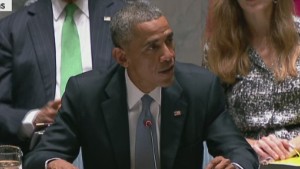
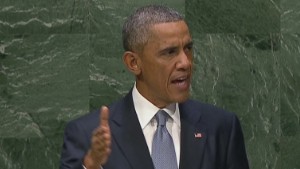
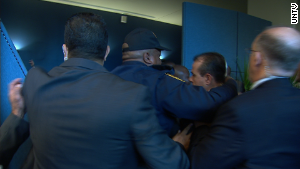
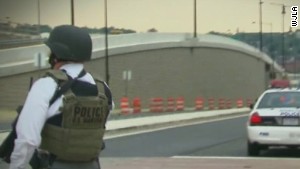
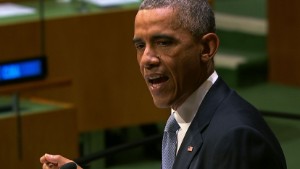
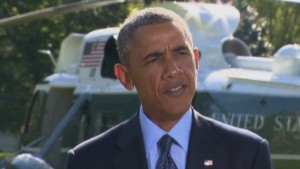
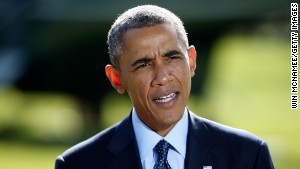
"Resolutions alone will
not be enough, promises on paper cannot keep us safe, lofty rhetoric and
good intentions will not stop a single terrorist attack," Obama said.
If governments abide by
the resolution and fully cooperate with one another, the world should
become safer, the President said. But it won't be easy, especially given
the potential of terrorism to spread beyond the Middle East: Obama
noted U.S. intelligence estimates over 15,000 individuals from more than
80 nations have gone to fight in Syria, exacerbating the conflict there
and raising the possibility they could "come home" and carry out deadly
attacks.
"If there was ever a
challenge in our interconnected world that could not be met by one
nation alone it is this: terrorists crossing borders and threatening to
unleash unspeakable violence," Obama said.

Obama: We stand with France against ISIS

Obama: 'Cancer' has ravaged Muslim world

Palestinians fight with U.N. security
The resolution passed
Wednesday requires nations to "suppress the recruiting, organizing,
transporting, equipping" and financing of "foreign terrorist fighters,"
according to Obama. It also also calls on government to "help build the
capacity of the states on the front lines of the fight."

U.S. on alert over homegrown extremists
But it will take more than corralling groups like ISIS militarily to permanently address the threat, Obama said.
"Potential recruits must
hear the words of former terrorist fighters who have seen the truth:
that groups like ISIL betray Islam by killing innocent men, women and
children, the majority of whom are Muslim," the President said, using
his administration's favored term for ISIS.
Obama also said the world
must do better at addressing root problems -- from economic insecurity
and political instability, including in Syria, where he called for "a
political solution" to the years-long civil war there -- that play a
role in drawing some to join terrorist groups.
"We must work to address
... the oppression, the lack of opportunity, too often the hopelessness
that can make some individuals susceptible to appeals of extremism and
violence," he said.
Unanimous vote, but hints of possible issues
After Obama's roughly
10-minute remarks, other world leaders echoed his anti-terrorism views,
from Nigerian President Goodluck Jonathan's blasting of groups like ISIS
and Boko Haram's "despicable campaign against humanity" to South Korean
President Park Geun-hye calling them the "scourge of mankind."
"Terrorism is nothing
new. It's been with us for years," French President Francois Hollande
said at the Security Council meeting. "But it has taken on another
dimension, and it wants to conquer territory now."
There are no "easy
answers or quick fixes" to addressing the terror threat in the Middle
East, Africa and beyond, British Prime Minister David Cameron said. But
something must be done, he added -- and for it to work, the world's
governments must be on the same page.
"We need a response that
involves every part of government and society, and every country
involved in the widest possible international coalition," Cameron said.
The fact countries like
Britain and France are backing the United States is hardly surprising.
But, as Obama said, what made Wednesday's vote notable is that "it is
very rare where the United Nations achieves the kind of consensus that
we see represented in this resolution."
In fact, officials from
China and Russia -- two (of the five) Security Council permanent members
who often stymy U.S. efforts at the United Nations, including those
related to the Middle East -- assertively staked out anti-terrorist
positions on Wednesday.
In their words, though, there were hints of possible diplomatic obstacles down the road.
Russian Foreign Minister
Sergey Lavrov, for instance, warned "against any attempt to narrow down
the problem" to select groups, urging the world not to have "double
standards in dividing terrorists into good terrorist and bad
terrorists." He also said any efforts must "address longstanding
conflicts" like those between Palestinians and Israel.

Obama: Russia shouldn't bully Ukraine

Obama: This is not America's fight alone

President Obama's 'War on Terror 2.0'
Meanwhile, Chinese
Foreign Minister Wang Yi warned about "terrorist organizations and
extremist ideologies ... competing with us for future generations,"
calling this "a battle bearing on the future of the world."
The world must act, he
agreed, but only with the United Nations' stamp of approval. Wang didn't
give examples, though the United States and several Arab allies
recently launched military strikes against ISIS targets in Syria --
without the U.N.'s or Syria's explicit approval.
"The United Nations and
the Security Council have to play the leading role in the global war on
terrorism," the Chinese minister said. "This is the only way to maintain
unity, achieve effective coordination and take assertive action."
Obama: U.S. leading, but can't do it alone
Before leading the Security Council meeting, Obama made a more far-reaching appeal earlier Wednesday for world cooperation against terror, climate change, Ebola
and a host of other issues, saying the world stands at a crossroads
"between war and peace; between disorder and integration; between fear
and hope."
Many of the world's
problems, the President said, stem from "the failure of our
international system to keep pace with an interconnected world."
The United States is taking a leading role in addressing many of these issues.
"I can promise you that
the United States of America will not be distracted or deterred from
what must be done," he said. "We are heirs to a proud legacy of freedom,
and we are prepared to do what is necessary to secure that legacy for
generations to come."
But, Obama said, America cannot do it alone.
The leaders of the
nations gathered Wednesday must decide whether they "will be able to
renew the purpose of the U.N.'s founding, and whether we will come
together to reject the cancer of violent extremism."
Obama outlined the U.S.
government's plan for tackling ISIS, which calls itself the Islamic
State, including airstrikes, training and equipping forces battling the
group, and working to cut off its financing and flow of recruits. But,
as he's said many times before, American ground troops won't be part of
the fight.
"Already, over 40
nations have offered to join this coalition. Today, I ask the world to
join in this effort," the President said. Those who have joined ISIS
"should leave the battlefield while they can."
Touches on Ebola, Ukraine, other topics
While terrorism
dominated Wednesday's conversation, it wasn't the only topic that Obama
addressed in his General Assembly speech. Among them:
Ukraine:
Russia's involvement in Ukraine represents "a vision of the world in
which might makes right -- a world in which one nation's borders can be
redrawn by another, and civilized people are not allowed to recover the
remains of their loved ones because of the truth that might be
revealed," Obama said, referring to efforts to recover the remains of
victims of Malaysia Airlines Flight 17, shot down over Ukraine in July.
If Russia rolls back its
involvement, the United States "will lift our sanctions and welcome
Russia's role in addressing common challenges," Obama said.
Ebola:
While the United States is sending medical workers and the military to
build treatment centers in Africa, the President called for a "broader
effort to stop a disease that could kill hundreds of thousands, inflict
horrific suffering, destabilize economies, and move rapidly across
borders."
Iran's nuclear program: Obama
urged Iranian leaders to work with the United States and others to
resolve Western concerns over the country's nuclear program. "We can
reach a solution that meets your energy needs while assuring the world
that your program is peaceful," he said.
Global poverty: "We
will do our part -- to help people feed themselves; power their
economies; and care for their sick," he said. "If the world acts
together, we can make sure that all of our children can enjoy lives of
opportunity and dignity."
Climate change:
The United States will work on the issue within its own borders, but
"we can only succeed in combating climate change if we are joined in
this effort by every major power," Obama said. "That's how we can
protect this planet for our children and grandchildren."
Syria: Even
as it provides even more support -- including militarily -- to moderate
opposition forces battling President Bashar al-Assad's government,
Obama said that "the only lasting solution to Syria's civil war is
political: an inclusive political transition that responds to the
legitimate aspirations of all Syrian citizens, regardless of ethnicity
or creed."










0 comments:
Post a Comment